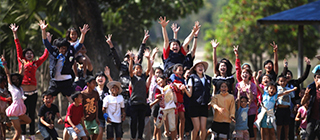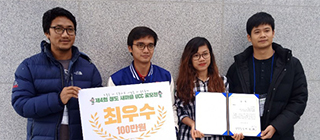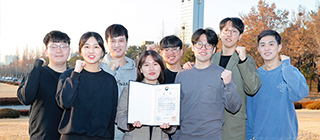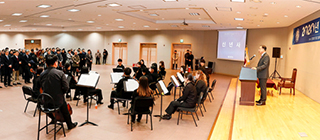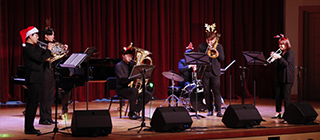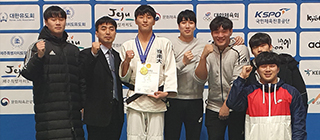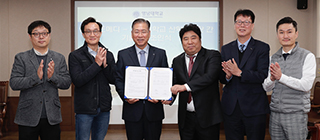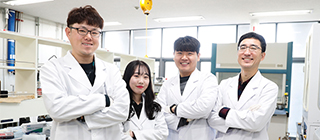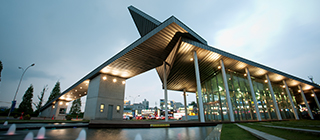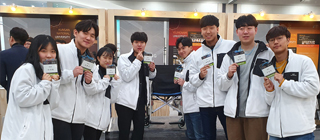-
Over 300 students sent abroad for overseas volunteer work, foreign expositions, etc. with school funding during the winter break YU offering huge support to increase opportunities for global experiences [December 27, 2019] <38th Overseas Volunteer Corps Launching Ceremony (Dec 20, 2019)> YU students will be sent all around the world with the start of the new year in 2020 to enhance their global capacities. During this winter break, 300 YU students will be sent abroad for various school-funded programs. The ‘Overseas Volunteer Corps’ is one of the representative overseas dispatch programs of YU. Since 2001, a total of approximately 2,750 students took part in 37 sessions of the Overseas Volunteer Corps. In this year’s winter break, 54 students in the 38th Overseas Volunteer Corps will do volunteer work in Laos, Vietnam and Thailand. They held their launching ceremony at the YU College of Education auditorium at 3 p.m. on the 20th and will depart for their respective countries on January 5 and engage in volunteer work for two weeks. The volunteers will take part in volunteer work including educational activities such as art and P.E. at local elementary schools and environmental improvement such as painting wall murals. In particular, the volunteers are planning to engage in cultural exchange by teaching students Korean and how to make traditional masks. Kim Jong-ha (21, Department of Commerce and Trade, junior), the team leader for the 38th Volunteer Corps to Vietnam, said, “I applied to the overseas volunteer corps because I wanted to gain different overseas experiences and take part in meaningful activities while in college. We divided our roles into science, art, hygiene and cultural exchange and held several meanings to prepare for this carefully.” He added, “It is a short period of just two weeks, but we will do our best to help the local students and by doing so, uplift the status of Korea and our school.” The overseas exposition program, which was introduced by YU for the first time last summer break, is also gaining a lot of interest by students. In this program, students visit overseas expositions, etc. to enhance their competence in their majors and to gain a global mindset. This is a program that also improves start-up and employment capacities by investigating start-up items abroad. This winter break, a total of 54 students in 22 teams will be sent to the US, Europe, Singapore and Japan. <YU Volunteer Corps at work> The most popular program among students from the various overseas dispatch programs supported by YU is ‘Window To the World’. ‘Window To the World’ is a program where students organize teams and set their own themes to go off on a backpacking trip abroad. Selected students are given round-trip airfares by the school. Since 2002, a total of about 2,890 students visited different parts of the world, and this winter break, 120 students will make teams of 2 or 3 to travel to different parts of the world including Europe, Australia and China. 'OPP' (Outbound Pilot Program) is another proud school-funded overseas dispatch program of YU. This is a short-term language training program for students who are interested in studying abroad or becoming an exchange student at an overseas sister school. A total of 1,880 students participated in the OPP since its beginning in 2009 and this winter break, 58 students will be dispatched to Malaysia for four weeks through the OPP to improve their language skills. YU President Sur Gil-soo said, “I hope that students will use their break to improve their internationalization capacities and gain various experiences. YU will continue to provide positive support by coming up with various overseas dispatch programs so that more students will be able to step out into the bigger world and improve their global leadership.”
-
Competed with 36 works such as dramas and advertisements Talked about the start of the Saemaul Undong and forest development in a video under the theme, ‘Saemaul for the Better World’ Two international student teams awarded such as the Grand Prize and Participation Prize showing high understanding of ‘Saemaul’ [December 26, 2019] International students studying at the YU Park Chung Hee School of Policy and Saemaul (Director Kim Gi-soo) won the grand prize (above video) at the ‘Saemaul UCC Contest’. The ‘Saemaul UCC Contest’, supervised by Cheongdo-gun and hosted by the Cheongdo Foundation for Korean Spiritual Culture, is a UCC production contest to share the spirit of Saemaul and it is in its fourth year this year. This year’s theme was ‘Saemaul Spirit that Values Today and Makes Tomorrow More Abundant’. Applications were received from college students around the nation from September to December 1, and a total of 36 pieces were submitted across various genres including drama, advertisement and animation. <International students of the YU Park Chung Hee School of Policy and Saemaul that won the grand prize at the 4th Saemaul UCC Contest> First and second reviews were conducted based on the content and uniqueness of the work, story and editing perfection, YouTube views, etc. to select a total of 26 winning pieces. The ‘Kmang Kmang’ Team (photo above) comprised of YU Park Chung Hee School of Policy and Saemaul international students Cheng Mardy (25, Cambodia), Muhammad Nur Syamsi (30, Indonesia), Ngo Tien Binh (29, Vietnam), and Basukala Sandeep (28, Nepal), received the grand prize. Under the theme ‘Saemaul for the Better World’, the ‘Kmang Kmang’ team explained about Cheongdo where the Saemaul Undong first started and the start of the Saemaul Undong in the 1970s for forest development and the development of Korea in a two-minute video, receiving high scores. Cheng Mardy said, “Taking the video contents production course offered by the YU PR team was very helpful. We were able to integrate the video production and editing skills with the knowledge learned in our majors at the graduate school to share our message in a short video.” Meanwhile, the Koffie Samuel (40) and Arthur Rexford (32) team (photo on right) who are international students from Ghana studying at the Park Chung Hee School of Policy and Saemaul who took part in this contest also received the Participation Prize. The two teams that were awarded were all composed of international students, but it was found that they had higher understanding on Saemaul than other participating Korean students as they are students majoring in Saemaul.
-
Department of Environmental Engineering ‘Eco Challengers’ win the Campus Eco Leader ‘Grand Prize’ Micro-dust reduction PR, campus purification campaigns, environmental debates, etc. Traveled around Daegu and Busan to promote ‘eco-friendly living’ as well as online PR [January 14, 2020] <YU Department of Environmental Engineering Students who won the grand prize at the 9th Campus Eco Leader> (from left to right: Kang Gwang-gyu, Yoon Chae-jung, Kim Seung-hyeon, Park Sung-eun, Lee Changw-oo, Jang Jae-wan, Cho Yoon-hee, Kim Byung-joon) YU students won the grand prize at the ‘9th Campus Eco Leader’. The Daegu Regional Environmental Office selected and has been supporting the activities of the ‘Campus Eco Leader’ for spreading eco-friendly lifestyle movements within the college campus. The 9th Campus Leaders were selected with 91 people from 12 teams at seven universities in the Daegu and Gyeongbuk regions in 2019, and it has been engaged in approximately eight months of activities since holding their launching ceremony in May. During this period, the Eco Leaders pursued PR, campaigns and projects for reducing micro-dusts, conserving energy and resource circulation in everyday life. The ‘Eco Challengers’ team comprised of YU Departmetn of Engineering junios Kim Seung-hyeon (24), Lee Chang-woo (24), Jang Jae-wan (23), Kang Gwang-gyu (23), Cho Yoon-hee (23), Park Sung-eun (22), Kim Byung-joon (22), Cheon Min-gi (22) and Yoon Chae-jung (20) took first place and received the Minister of Environment Award. <Plastic Reduction Project (left) and Citizen Awareness Survey (right)> The Eco Challengers Team engaged in not only street PR such as quiz events on the hazards of micro-dusts and how to prevent it, as well as a variety of other participation-type programs such as environmental debates, campus purification campaigns, fire prevention projects, plastic-free challenge, and micro-dust reduction projects. Furthermore, the children’s center environment-friendly education was also carried out to enhance the environmental issue awareness of youths. They produced project and campaign contents as card news as well to engage in online PR activities via social media to maximize PR effects. Their activities were not limited to the campus. They also conducted environmental issue awareness surveys on general citizens in Daegu and Busan and decided the direction of the project for practicing eco-friendly lifestyles. They carried out their campaign by going to the YU Central Library that many students visit and Dongseong-ro of Daegu with a large floating population. The Eco Challengers team said, “We held environmental debates to form consensus on environmental issues with other students, while also visiting expert agencies to talk about the status, issues and response measures for micro-plastics and held interviews with experts and met with fishers. We also made and installed pickets with the message of preventing forest fires at the Biseulsan (Mt.) hiking trail and also took part in other activities to gather materials and pursue the project.” They added, “We reflected trends on environmental issues for each project and we were recognized four expertise, thus making it possible to receive good evaluations.” Team Leader Park Sung-eun of the Eco Challengers Team said, “As a student majoring in environmental engineering, I believe that it is possible to play the role of a middle-man between the general public and experts.” She added, “I will continue to stay interested in environmental issues and continue activities as an Eco Leader to help more people gain awareness on such issues and participate in environmental preservation activities in everyday life.”
-
2020 YU New Year’s Kick-off Meeting held while enjoying a recital by students of the College of Music 2019 Year-end Meeting finished with the ‘Year-End Recital’ receiving huge responses [January 2, 2020] YU (President Sur Gil-soo) College of Music students held a small recital to sound off the new year. This was a unique kick-off meeting of YU held on the 2nd. At the ‘2020 YU Kick-off Meeting’ held at the YU Cheonma Art Center at 10 a.m. on the 2nd, over 200 professors and employees including YU President Sur Gil-soo attended to enjoy the performance and start the first work-day of the new year. YU College of Music students held an orchestra performance for this recital. The short performance before, during and after the kick-off meeting softened the stiff mood of kick-off meetings making it more comfortable. They performed movie OSTs such as Titanic, Lion King and Scent of a Woman, as well as classical music to help the faculty start their first day of 2020 pleasantly. YU President Sur Gil-soo said, “We started this new year kick-off ceremony with a small recital with the hope that this warm gift by students will be able to breathe in energy to the professors and employees for the new year.” He added, “I hope that like this beautiful performance of orchestral harmony, faculty, students and all YU members will work hard this year for the development of our school.” Meanwhile, YU also ended the year with the Year-end Recital in 2019, which was received with huge praise from members of YU. The year-end recital was joined by vocalists representing Korea in the global stage, YU professors, musical actors and jazz vocalists, with popular alumni putting on performances of various genres on stage.
-
Over 300 faculty, students etc. end the year enjoying a recital at the Cheonma Art Center on the 19th YU alumni sponsors all costs for recital for third straight year [December 20, 2019] <2019 YU Year-end Recital 'Brass Band'> YU (President Sur Gil-soo) held a year-end recital with faculty and students to close out the year of 2019. Over 300 people including faculty and students as well as YU president Sur Gil-soo attended the ‘2019 Year-end Recital’ held at the YU Cheonma Art Center Chamber Hall at 4 p.m. on the 19th. This event was made even more meaningful with the attendance of not only members of YU, but also directors of the alumni association such as YU General Alumni Association Chairman Jung Tae-il. <Alumni Lee Dong-hwan, the first Korean baritone exclusive singer for Deutsche Oper of Berlin, Germany> This year-end recital, which was hosted by YU Major of Voice Professor Lee Hyun and soprano Lee Jung-ah, was comprised of various genres performed by popular alumni including singers representing Korea in the global stage, YU professors, musical actors and actresses, and jazz vocalists. YU Major of Orchestral Music Professor Yeo Eun-young performed a piano solo, baritone Lee Dong-hwan, who graduated from the YU College of Music and who is an exclusive vocalist for Deutsche Oper in Berlin, Germany, the first as a Korean, and jazz vocalist Jung Eun-joo (left on top photo), and musical actress Hong Bon-young (right on bottom photo) performed in this recital. In addition, the international student from China, Hou Pan-fung (right on top photo), in the YU Graduate School of Music PhD program performed a popular Chinese song. Also, the Brass Band performed a brass instrument ensemble, the faculty choir sang their music, and YU Major of Dance Professor Woo Hye-young put on an amazing ballet for the audience. <YU Professor Choir Performance> This recital was designed so that YU professors, employees and students could communicate with each and end the year on a high note to close out the year. YU has been holding the year-end recital by inviting YU members and alumni since 2017 and has been very popular. All costs for the recital have been paid for by the YU General Alumni Association and alumni. <Ballet performance directed by Major of Dance Professor Woo Hye-young> YU President Sur Gil-soo said, “I would like to thank the YU General Alumni Association and alumni seniors who happily helped to make the year-end recital possible for the third straight year,” and added, “I hope that YU members enjoyed the performance to end the year on a high note.”
-
Seo Bo-min (-66kg division) wins gold, Doh Hyoung-joon (–100kg division) wins silver International tournament joined by over 2,000 people from 10 countries around the world [December 17, 2019] <Seo Bi-min (third from left) won the gold medal at the 2019 Jeju Cup International Judo Tournament in the college men’s –66kg division> The YU judo team (Coach Lee Jung-hwa) won one gold medal and one silver medal at the 2019 Jeju Cup International Judo Tournament, once again reaffirming YU’s status as a college powerhouse in judo. This is an international judo festival in which over 2,000 athletes from 10 countries around the world gathered to compete at the Halla Gymnasium in Jeju-do from December 9 to December 13. At this tournament Seo Bo-min (20, Department of Special Physical Education, sophomore) took first place in the college men’s –66kg division and Doh Hyoung-joon (20, Department of Special Physical Education, sophomore) won the silver medal in the –100kg division. At the semi-finals, Seo Bo-min defeated Kim Jung-woo from Yong In University with ippon and in the finals, he won against Ham Woo-shik of the Korea National Sport University by disqualification with three shido. Doh Hyoung-joon faced off against Han Ji-hoon from the Korea National Sport University at the finals. While attempting a move against Han, he was countered and had to settle for the silver medal. YU Judu Head Coach Lee Jung-hwa expressed his appreciation saying, “I first thought it would be difficult to win medals at this tournament as it is a huge international tournament and because only a few of our members participated due to injuries. The athletes were able to reap good results by staying focused and doing their best.” He added, “I think we ended off the year well by winning medals at an international tournament. We will do our best to perform even better and achieve more in 2020.”
-
Food Science and Technology Professor Han Gi-dong develops ‘whitening cosmetic manufacturing technology using persimmon fermented extracts’ Prevention of leukoplakia, freckles... technology transfer wort 110 million KRW with Wizmedi YU supports early commercialization through industry-academic cooperation [December 17, 2019] <The ‘whitening cosmetic manufacturing technology using persimmon fermented extracts’ will be transferred to companies for commercialization> (from left to right: YU Tech Transfer Commercialization Center Director Lee Hee-yong, Food Science and Technology Professor Han Gi-dong, YU President Sur Gil-soo, Wizmedi CEO Choi Yong-hoon, Korea Technology Finance Corporation Daegu Technology Innovation Center Regional Director Choi Gi-jin, Wizmedi co-CEO Han Yoon-soo) The outstanding technologies possessed by YU (President Sur Gil-soo) will be transferred for commercialization. The technology transferred to companies is on ‘whitening cosmetic ingredient compounds’ including persimmon fermented extracts’ developed by YU Department of Food Science and Technology Professor Han Gi-dong. YU signed a technology transfer contract with Wizmedi (CEO Choi Yong-hoon, Han Yoon-soo) on the 10th. This technology transfer signing ceremony was attended by YU President Sur Gil-soo, co-CEOs of Wizmedi Choi Yong-hoon and Han Yoon-soo, Korea Technology Finance Corporation Daegu Technology Innovation Center Regional Director Choi Gi-jin, YU Tech Transfer Commercialization Center Director Lee Hee-yong, and Food Science and Technology Professor Han Gi-dong. At the signing ceremony, YU President Sur Gil-soo stated, “Light is now being shed on the technologies and research capacities of YU by being transferred to a company,” and added, “Through continuous industry-academic cooperation, YU will take the lead in creating new growth engines where the university, companies and communicate can growth together.” YU Tech Transfer Commercialization Center Director Lee Hee-yong said, “The Tech Transfer Commercialization Center will offer continuous support to companies so that it can be commercialized in products early on. The technology being transferred is technology for manufacturing whitening cosmetic products using persimmon fermented extracts, and unlike existing technologies, it is not applied directly on tryosinase and therefore, it can prevent side effects such as leukoplakia and freckles. As the K-beauty industry is growing rapidly in China and Southeast Asia, it is expected that the company receiving this technology transfer will be able to create whitening cosmetic product markets and increase revenue. Food Science and Technology Professor Han Gi-dong, who is the principal inventor of this technology, said, “It is fulfilling to see that research on practical technologies reaped achievements. I hope to continue to contribution to the university, companies and community through research that can be of help to the food and bio industry.” Wizmedi CEO Choi Yong-hoon said, “I would like to thank YU and the researcher for transferring this outstanding research outcome. We will do our best to commercialize it and create an excellent case of industry-academic cooperation.” This technology transfer contract was made through the technological mediation of the Korea Technology Finance Corporation Daegu Technology Innovation Center. With this technology transfer, YU signed a technology transfer contract worth 110 million KRW and it plans to catapult commercialization through product commercialization support. Korea Technology Finance Corporation Daegu Technology Innovation Center Regional Director Choi Gi-jin said, “I am happy to see that through this technology transfer with YU, Wizmedi procured new prospective technologies for commercialization,” and added, “Our center will also do our best to actively support the discovery of outstanding technologies of the university and so that the company can be able to resolve funding difficulties during the technology transfer process.”
-
‘Best Poster Award (Gold)’ at ICAE, an international academic conference in the electromaterials and element technology sector Developed fibers that can be operated by integrating inorganic light emitting diodes Enhanced possibilities to activate the wearable device industry [December 13, 2019] <YU Research Team that won the Best Poster Award (Gold) at the 2019 International Conference on Advanced Electromaterials (ICAE)> (from left to right: Researcher Lee Young-woong, Seo Ji-young, Kim Dong-woo, Department of Electronic Engineering Professor Park Si-hyeon) <?xml:namespace prefix = "o" /> Professor Park Si-hyeon’s (46) research team at the YU Department of Electronic Engineering won the Best Poster Award (Gold) at the 2019 ICAE (International Conference on Advanced Electromaterials). The ICAE holds a large-scale international academic conference encompassing all next-generation electromaterials and element technology sectors. At the 5th international academic conference held at the Ramada Plaza Jeju Hotel from November 5 to 8, researchers from universities and research institutes from 25 countries around the world participated to present over 1,100 of the most recent research outcomes. The study published by the YU research team was titled ‘Integration of LED Arrays onto Textile and Their Individual Control’. The research team coated and processed synthetic resins such as polyester and polyurethane on the surface of fibers to manufacture fibers on which general semiconductor processes such as sputter and thermal deposition is possible to integrate LED matrix on the surface of this fiber in order to configure fine electronic circuits for display and individual control. The leader of this research team, Professor Park, said, “I have been interested on conducting research on light emitting fibers using inorganic light emitting diodes from the perspective of safety and reliability in the fiber electronics sector from long ago. However, there were many difficulties in applying it for industrialization due to difficulties of electronic circuit configuration and precision, as well as low flexibility, etc., and therefore, we focused more on researching and developing light emitting fibers using organic materials.” He went on saying, “Through this research, we were able to integrate inorganic light emitting diodes, which was difficult to configure with past technologies, to develop controllable fibers. The results of this study are noteworthy in that it shows the possibilities for the activation of the wearable device industry.” This study was joined by Professor Park, Graduate School of Electronic Engineering Kim Dong-woo (26, third term in master’s program, photo on right), Seo Ji-young (23, third term in master’s program, photo on right) and YU LED-IT Fusion Technology Research Center researcher Lee Young-woong (38). Kim Dong-woo and Seo Ji-young, who participated as primary authors of this study, finally reaped the fruits from their research since their undergraduate years through the YU Department of Electronic Engineering’s bachelor’s-master’s linked program. Mr. Kim has already been recognized for his research capacities by winning the best poster award at the 2nd Korean LED Optoelectronics academic conference in February. The research team announced its future research plans stating, “We plan to draw up precise electronic circuits inside of fibers through fiber weaving process R&D. We will continue research on the process for creating fibers on which mini/micro LEDs can be applied, which is receiving attention as next-generation displays, and fiber coating.”
-
[2019 Joongang University Rankings] Analysis on thesis citations in international academic journals for the past 5 years Of 8 academic fields, placed first in two fields such as math and computer science [See original article] ▶ https://news.joins.com/article/23639742 [Journalist Kang Hong-joon] It was found that Inje University had high competitiveness in physics, YU in math, and Sejong University in social science and space science. The Joongang Ilbo university ranking team analyzed research competitiveness based on citations of theses published by domestic universities for five years from 2014 to 2018 together with the global academic data analysis company, Clarivate Analytics. During this period, the citations of theses in Science Citation Index (SCI) international academic journals (top 25% academic journals in their respective fields) announced in 22 academic fields such as physics, math, science and clinical medicine. Citations show how many times a thesis is cited after being published and this number can show the impact of a thesis on following studies. Researchers by professors, etc. of Inje University published a total of 150 theses in high ranking academic journals in the physics sector during this period and the category normalized citation impact (CNCI) of each sector for these studies was 5.63. This number means that the impact is about five times higher than the global average (1.0). The impact factor of YU in math was found to be 3.59 and 2.02 for computer science. The research capacities of the provincial private university professors were found be first place among Korean universities, and is higher than the global average. Sejong University also exhibited remarkable achievements in the space science and social science sectors. The impact of theses in Sejong University’s space science sector was found to be 3.15 and the impact factor of theses in social science was 2.74. Comparatively, the impact factor of all domestic universities in the economic and business sectors was found to be below the global average (1.0). During this period, professors of Korea University in the economics and business sectors published 507 theses in international academic journals, taking first place in the number of theses. However, the impact factor of these theses was 0.78. Seoul National University (477, 0.77) and Sungkyunkwan University (350, 0.90) also had many theses, but their impact factors were low. The CEO of Clarivate Analytics Korea said, “In some areas, Korea caught up to Japan in research capacities. However, it seems like the focus is more on the quantity of research rather than quality. The Netherlands, Switzerland and Belgium have much fewer theses than Korea, but their qualitative levels are very high. The focus should be on conducting excellent research in terms of quality, rather than on increasing the number of theses.” ▶ CNCI (Category Normalized Citation Index) An index for evaluating the quality of a thesis. The number of citations in a thesis is the regular value considering the theme, year of publication, and type of thesis. When only talking about the number of citations of a thesis, the characteristics of different academic sector may be overlooked. This is because in some fields, the total number of citations is low and therefore cannot be compared to theses in other fields. Considering the issue that the value of universities with only a few theses would be high, domestic universities with at least 100 theses were analyzed. Sejong University also exhibited remarkable achievements in the space science and social science sectors. The impact of theses in Sejong University’s space science sector was found to be 3.15 and the impact factor of theses in social science was 2.74. Comparatively, the impact factor of all domestic universities in the economic and business sectors was found to be below the global average (1.0). During this period, professors of Korea University in the economics and business sectors published 507 theses in international academic journals, taking first place in the number of theses. However, the impact factor of these theses was 0.78. Seoul National University (477, 0.77) and Sungkyunkwan University (350, 0.90) also had many theses, but their impact factors were low. The CEO of Clarivate Analytics Korea said, “In some areas, Korea caught up to Japan in research capacities. However, it seems like the focus is more on the quantity of research rather than quality. The Netherlands, Switzerland and Belgium have much fewer theses than Korea, but their qualitative levels are very high. The focus should be on conducting excellent research in terms of quality, rather than on increasing the number of theses.” ▶ CNCI (Category Normalized Citation Index) An index for evaluating the quality of a thesis. The number of citations in a thesis is the regular value considering the theme, year of publication, and type of thesis. When only talking about the number of citations of a thesis, the characteristics of different academic sector may be overlooked. This is because in some fields, the total number of citations is low and therefore cannot be compared to theses in other fields. Considering the issue that the value of universities with only a few theses would be high, domestic universities with at least 100 theses were analyzed.
-
<Creative Comprehensive Design Contest> ’Grand prize’ beating 145 teams from around the nation <Smart Car Simulation Hackathon> ‘First Prize’... Received engineering education innovation meritorious person medal [December 6, 2019] <YU ‘Challengers’ team that won the grand prize in the 2019 Engineering Festival ‘Creative Comprehensive Design Contest’ sector> YU (President Sur Gil-soo) swept the awards winning the grand prize and first place prize. At the ‘2019 Engineering Festival’ held at the Songdo Convensia in Incheon on the 26th and 27th of last month, the YU ‘Challengers’ team that took part in the ‘Creative Comprehensive Design Contest’ won the grand prize, thus receiving the Minister of Trade, Industry and Energy Award. The ‘Challengers’ team is a multi-disciplinary team centering on the YU College of Mechanical and IT Engineering with Bae Sung-ho (23, junior), Bae Hyung-chang (23, junior) and Cho Hwan-jin (23, junior) of the School of Mechanical Engineering, Kim Ji-hwan (24, junior), Jang Joo-eon (23, junior) and Koo Gyo-in (22, junior) of the Department of Information and Communication Engineering, Seo Myo-sung (21, junior) of the Department of Psychology, and Lee Da-bin (19, sophomore) of the Department of Visual Communication Design. They submitted their work called the ‘Smart Module for Safe Wheelchairs’ in this contest joined by 145 teams around the nation, and took home the grand prize. The ‘Challengers’ team applied the concept of Internet of Things (IoT) in the simple mechanical drive part of existing wheelchairs and received high assessments for upgrading it to a smart everyday device. There were many creative ideas from engineering students around the world such as in the fields of electric/autonomous cars, IoT home appliances, robots, bio-health, aviation/drone, etc., drawing huge attention. At the ‘Smart Car Simulation Hackathon’ operated by the YU Engineering Education Hub Center at the Engineering Festival, the YU team including Jung Jin-ho (25, senior) of the YU Department of Computer Engineering took first place and received the Korea Institute for Advancement of Technology Award. The ‘Smart Car Simulation Hackathon’ is a contest for changing the structure of the vehicle or producing an engineering-optimized racing car using automobile mechanisms, data analysis, and racing simulation AI. <YU wins first place at the 2019 Engineering Festival ‘Smart Car Simulation Hackathon> Furthermore, YU Engineering Education Hub Center Director Song Dong-joo (Professor at the School of Mechanical Engineering, first on left in photo below) and researcher Ryu Mi-jung (second from left) were selected as meritorious persons for engineering education innovation and received the Minister of Trade, Industry and Energy award. They were recognized for not only fostering creative engineering human resources, but also developing and operating programs reflecting industrial demands technological changes. <Engineering education innovation persons of merit medal awarding ceremony> YU President Sur Gil-soo said, “This was made possible by constructing systematic engineering personnel fostering programs, while operating the engineering education hub center for many years.” He added, “Engineering students are important human resources who will lead the future industries of the nation. YU will continue to work hard to foster convergent human resources with various knowledges in their majors that will lead the age of the fourth industrial revolution.” Meanwhile, the 2019 Engineering Festival sponsored by the Ministry of Trade, Industry and Energy and co-hosted by the Korea Institute for Advancement of Technology and the Engineering Education Innovation Association is an event designed to foster engineering personnel who will lead the next-generation convergence industries and was joined by over 10,000 people from 102 universities in both Korea and abroad.
